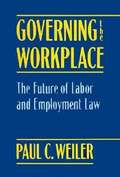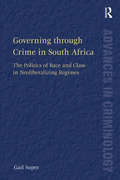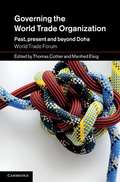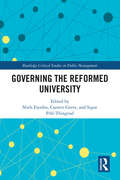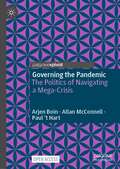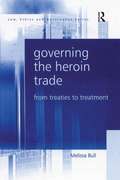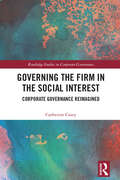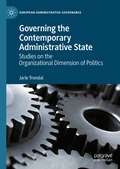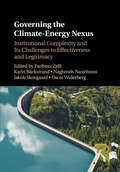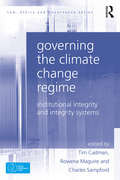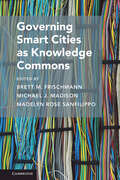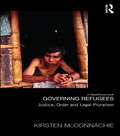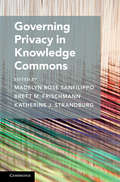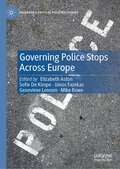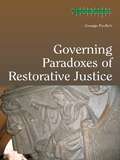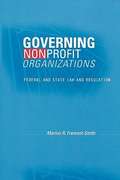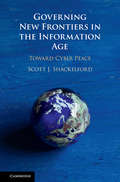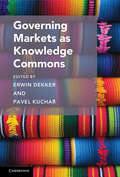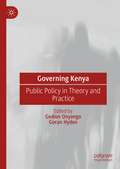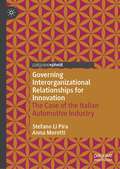- Table View
- List View
Governing The Workplace: The Future Of Labor And Employment Law
by Paul C. WeilerLabor lawyer Paul Weiler examines the social and economic changes that have profoundly altered the legal framework of the employment relationship. He not only discusses a wide range of issues, from wrongful dismissal to mandatory drug testing and pay equity, but he also develops a blueprint for the reconstruction of the law of the workplace, especially designed to give American workers more effective representation.
Governing through Crime in South Africa: The Politics of Race and Class in Neoliberalizing Regimes (New Advances in Crime and Social Harm)
by Gail SuperThis book deals with the historic transition to democracy in South Africa and its impact upon crime and punishment. It examines how the problem of crime has emerged as a major issue to be governed in post-apartheid South Africa. Having undergone a dramatic transition from authoritarianism to democracy, from a white minority to black majority government, South Africa provides rich material on the role that political authority, and challenges to it, play in the construction of crime and criminality. As such, the study is about the socio-cultural and political significance of crime and punishment in the context of a change of regime. The work uses the South African case study to examine a question of wider interest, namely the politics of punishment and race in neoliberalizing regimes. It provides interesting and illuminating empirical material to the broader debate on crime control in post-welfare/neoliberalizing/post transition polities.
Governing the World Trade Organization
by Manfred Elsig Thomas CottierLike many other international organizations, the World Trade Organization stands at a crossroads. There is an obvious imbalance between the organization's dispute settlement arm and its negotiation platform. While its current rules, supported by a strong dispute settlement system, have provided some buffering against the negative effects of the financial crises, its negotiation machinery has not produced any substantial outcomes since the late 1990s. It has become obvious that the old way of doing business does not work any more and fresh ideas about governing the organization are needed. Based on rigorous scholarship, this volume of essays offers critical readings on the functioning of the system and provides policy-relevant ideas that go beyond incremental redesign but avoid the trap of romantic scenarios.
Governing the Use-of-Force in International Relations
by Aiden Warren Ingvild BodeThis book examines US recourse to military force in the post-9/11 era. In particular, it evaluates the extent to which the Bush and Obama administrations viewed legitimizing the greater use-of-force as a necessary solution to thwart the security threat presented by global terrorist networks and WMD proliferation.
Governing the Reformed University (Routledge Critical Studies in Public Management)
by Niels Ejersbo Carsten Greve Signe Pihl-ThingvadUniversities are important public institutions and are seen as key drivers for a country’s economic and intellectual development. Their ability to deliver relevant research and education at the highest level have an impact on growth and progress in society, and governments attempt to control and govern the development of the universities. It is no longer left to the individual researcher or the institution to determine the role of the university. Universities have traditionally had a special role in society with a high degree of autonomy and independence. They have been described as a self-governing Republic of Science and their internal organization is characterized as "academic tribes". However, universities can also be viewed as institutions with somewhat similar characteristics as other public institutions with highly professionalized staff. Governing the Reformed University is a coherent volume based on a unique data set. The aim of the book is to quantitatively and qualitatively understand and explain how reforms and management instruments are implemented and how it influences different levels of the organization from the top management level to the employees within universities. It contributes to the knowledge of reform and reform impact in higher education. It also adds to our understanding of management and governance at universities and through which mechanisms management works at universities. This book builds on and adds to the knowledge of studies of reform and governance at universities. The data used in the book consists of a number of data sets and is collected as part of a comprehensive research project. Academics and policy makers alike in the fields of public administration, public management, public policy, educational studies and accountancy will find this of high interest.
Governing the Pandemic: The Politics of Navigating a Mega-Crisis
by Arjen Boin Allan McConnell Paul 't HartThis open access book offers unique insights into how governments and governing systems, particularly in advanced economies, have responded to the immense challenges of managing the coronavirus pandemic and the ensuing disease COVID-19. Written by three eminent scholars in the field of the politics and policy of crisis management, it offers a unique ‘bird’s eye’ view of the immense logistical and political challenges of addressing a worst-case scenario that would prove the ultimate stress test for societies, governments, governing institutions and political leaders. It examines how governments and governing systems have (i) made sense of emerging transboundary threats that have spilled across health, economic, political and social systems (ii) mobilised systems of governance and often fearful and sceptical citizens (iii) crafted narratives amid high uncertainty about the virus and its impact and (iv) are working towards closure and a return to ‘normal’ when things can never quite be the same again. The book also offers the building blocks of pathways to future resilience. Succeeding and failing in all these realms is tied in with governance structures, experts, trust, leadership capabilities and political ideologies. The book appeals to anyone seeking to understand ‘what’s going on?’, but particularly academics and students across multiple disciplines, journalists, public officials, politicians, non-governmental organisations and citizen groups.
Governing the Heroin Trade: From Treaties to Treatment (Law, Ethics And Governance Ser.)
by Melissa BullExamining the historical, economic and political context for the current prohibition of particular drugs, this study investigates the problem of drug control and provides a systematic analysis of the development of the international system of regulation. It identifies the political rationalities that provided the basis of that system and positions these moral justifications for exercising power in relation to the practical programmes that put them into practice. The work not only catalogues the techniques and strategies employed in the process of governing illicit drugs, it also notes the failures, unintended consequences and other difficulties associated with getting such programmes to work. It will be of key interest to students and scholars of crime and criminology, law and society, medico-legal studies and health studies.
Governing the Hearth
by Michael GrossbergPresenting a new framework for understanding the complex but vital relationship between legal history and the family, Michael Grossberg analyzes the formation of legal policies on such issues as common law marriage, adoption, and rights for illegitimate children. He shows how legal changes diminished male authority, increased women's and children's rights, and fixed more clearly the state's responsibilities in family affairs. Grossberg further illustrates why many basic principles of this distinctive and powerful new body of law--antiabortion and maternal biases in child custody--remained in effect well into the twentieth century.
Governing the Firm in the Social Interest: Corporate Governance Reimagined (Routledge Studies in Corporate Governance)
by Catherine CaseyThe corporate business enterprise is a core institution of capitalism. It holds immense political, economic, and cultural power in society. It mobilizes social and planetary resources to its utility in pursuit of private profit maximization and with little regard for social concerns. Its influence over so much of societal life and effects on the natural environment raise critical questions about the firm and its governance in democratic society. Various voices seek reforms of regulation and corporate governance practices to those shaped by the neoliberal policies persisting in the current decades. But prospects for amelioration within our current horizons of thinking appear elusive. This book contributes a distinctly social theoretical approach to the social problem of governing the firm. Its discussions complement debates in economics, politics, and law. Its critical social theorizations challenge conventional understandings of the firm and neoliberal legitimacies of its governance and posit alternatives. The book explores the social relations and moral fabric of the firm and the creativity of human action at work. It proposes a reimagined corporate governance premised on just recognition of that social vitality. It invites unprecedented collaboration for a robust participatory democracy for governing the firm and market action oriented to ecological and social sustainability.
Governing the Contemporary Administrative State: Studies on the Organizational Dimension of Politics (European Administrative Governance)
by Jarle TrondalThis book examines the transformation of the administrative state, since it was first coined by Dwight Waldo seventy years ago. Empirically, the book assesses how the administrative state is facing endogenous reforms through administrative devolution, as well as exogenous shifts by the rise of multilevel administrative systems and international bureaucracy. Facing dual shifts, the book offers a comprehensive analysis of how the administrative state handles three interconnected challenges: first, a need for innovation and reform, as well as stability and robustness; second, administrative autonomy among regulatory bodies, as well as political leadership and democratic accountability; and third, nation-state sovereignty and international collaboration. It also highlights the robust character of the administrative state by demonstrating profound stability in public governance even during times of profound turbulence. It will appeal to scholars and students of public policy, public administration and global governance, as well as practitioners interested in new developments in public governance.
Governing the Commons
by Elinor OstromCongratulations to Elinor Ostrom, Co-Winner of The Sveriges Riksbank Prize in Economic Sciences in Memory of Alfred Nobel 2009!The governance of natural resources used by many individuals in common is an issue of increasing concern to policy analysts. Both state control and privatization of resources have been advocated, but neither the state nor the market have been uniformly successful in solving common pool resource problems. After critiquing the foundations of policy analysis as applied to natural resources, Elinor Ostrom here provides a unique body of empirical data to explore conditions under which common pool resource problems have been satisfactorily or unsatisfactorily solved. Dr. Ostrom first describes three models most frequently used as the foundation for recommending state or market solutions. She then outlines theoretical and empirical alternatives to these models in order to illustrate the diversity of possible solutions. In the following chapters she uses institutional analysis to examine different ways--both successful and unsuccessful--of governing the commons. In contrast to the proposition of the tragedy of the commons argument, common pool problems sometimes are solved by voluntary organizations rather than by a coercive state. Among the cases considered are communal tenure in meadows and forests, irrigation communities and other water rights, and fisheries.
Governing the Climate-Energy Nexus: Challenges to Coherence, Legitimacy and Effectiveness
by Fariborz Zelli Karin Bäckstrand Naghmeh Nasiritousi Jakob Skovgaard Oscar WiderbergCombating climate change and transitioning to fossil-free energy are two central and interdependent challenges facing humanity today. Governing the nexus of these challenges is complex, and includes multiple intergovernmental and transnational institutions. This book analyses the governance interactions between such institutions, and explores their consequences for legitimacy and effectiveness. Using a novel analytical framework, the contributors examine three policy fields: renewable energy, fossil fuel subsidy reform, and carbon pricing. These fields are compared in terms of their institutional memberships, governance functions and overarching norms. Bringing together prominent researchers from political science and international relations, the book offers an essential resource for future research and provides policy recommendations for effective and legitimate governance of the climate-energy nexus. Rooted in the most recent research, it is an invaluable reference for researchers, policymakers and other stakeholders in climate change and energy politics.
Governing the Climate Change Regime: Institutional Integrity and Integrity Systems (Law, Ethics and Governance)
by Tim Cadman Rowena Maguire Charles SampfordThis volume, the second in a series of three, examines the institutional architecture underpinning the global climate integrity system. This system comprises an inter-related set of institutions, governance arrangements, regulations, norms and practices that aim to implement the United Nations Framework Convention on Climate Change (UNFCCC). Arguing that governance is a neutral term to describe the structures and processes that coordinate climate action, the book presents a continuum of governance values from ‘thick’ to ‘thin’ to determine the regime’s legitimacy and integrity. The collection contains four parts with part one exploring the links between governance and integrity, part two containing chapters which evaluate climate governance arrangements, part three exploring avenues for improving climate governance and part four reflecting on the road to the UNFCCC's Paris Agreement. The book provides new insights into understanding how systemic institutional and governance failures have occurred, how they could occur again in the same or different form and how these failures impact on the integrity of the UNFCCC. This work extends contemporary governance scholarship to explore the extent to which selected institutional case studies, thematic areas and policy approaches contribute to the overall integrity of the regime.
Governing Smart Cities as Knowledge Commons (Cambridge Studies on Governing Knowledge Commons)
by Brett M. Frischmann Michael J. Madison Madelyn Rose SanfilippoThe rise of 'smart' – or technologically advanced – cities has been well documented, while governance of such technology has remained unresolved. Integrating surveillance, AI, automation, and smart tech within basic infrastructure as well as public and private services and spaces raises a complex set of ethical, economic, political, social, and technological questions. The Governing Knowledge Commons (GKC) framework provides a descriptive lens through which to structure case studies examining smart tech deployment and commons governance in different cities. This volume deepens our understanding of community governance institutions, the social dilemmas communities face, and the dynamic relationships between data, technology, and human lives. For students, professors, and practitioners of law and policy dealing with a wide variety of planning, design, and regulatory issues relating to cities, these case studies illustrate options to develop best practice. Available through Open Access, the volume provides detailed guidance for communities deploying smart tech.
Governing Risks (The International Library of Essays in Law and Society)
by Pat O'MalleyContemporary law and government are increasingly characterized by a focus on risk. Fields such as health, psychiatry, criminal justice, vehicle safety, urban design and environmental governance all provide examples of settings in which problems are dealt with as risks. While risk has become more prominent, there have also been changes in the nature of risk techniques deployed. Whereas welfare states provided many services through socialized risk - such as social insurances covering health, employment and old age - increasing emphasis is now placed on individual risk management arrangements such as private insurance. In this environment, the positive side of risk has also been made more salient. Enterprise, innovation and risk-taking have become qualities valued, or even required, of current governance. In this volume, the most influential examinations and interpretations of this major trend have been brought together, in order to make clear the range and diversity, the spread and penetration of risk in contemporary societies.
Governing Risk in Gm Agriculture
by Michael Baram Mathilde BourrierThis book addresses the issues and methods involved in governing risks posed by genetically modified (GM) agriculture. It examines the evolution of policies intended to ensure the safety of GM crops and food products in the United States and Europe and the regulatory approaches and other social controls employed to protect human health, the environment, conventional farming and foods, and the interests and rights of consumers. Discussion encompasses the cultural, political, and economic forces that shape the design and application of the methods of risk governance, as well as other contextual features such as the influence of multinational companies seeking acceptance of their GM ventures. This discussion also examines the influence of the dynamic public discourse fostered by progressive concepts of risk governance and the approaches taken to meet its demands for transparency, public participation, and appropriate consideration of public perceptions and values despite conflicting views of experts.
Governing Refugees: Justice, Order and Legal Pluralism (Law, Development and Globalization)
by Kirsten McConnachieRefugee camps are imbued in the public imagination with assumptions of anarchy, danger and refugee passivity. Governing Refugees: Justice, Order and Legal Pluralism challenges such assumptions, arguing that refugee camps should be recognized as spaces where social capital can not only survive, but thrive. This book examines camp management and the administration of justice in refugee camps on the Thailand-Burma border. Emphasising the work of refugees themselves in coping with and adapting to encampment, it considers themes of agency, sovereignty and legal pluralism in an analysis of local governance and the production of order beyond the state. Governing Refugees will appeal to anyone with relevant interests in law, anthropology and criminology, as well as those working in the area of refugee studies.
Governing Privacy in Knowledge Commons (Cambridge Studies on Governing Knowledge Commons)
by Madelyn Rose Sanfilippo Brett M. Frischmann Katherine J. StrandburgGoverning Privacy in Knowledge Commons explores how privacy impacts knowledge production, community formation, and collaborative governance in diverse contexts, ranging from academia and IoT, to social media and mental health. Using nine new case studies and a meta-analysis of previous knowledge commons literature, the book integrates the Governing Knowledge Commons framework with Helen Nissenbaum's Contextual Integrity framework. The multidisciplinary case studies show that personal information is often a key component of the resources created by knowledge commons. Moreover, even when it is not the focus of the commons, personal information governance may require community participation and boundaries. Taken together, the chapters illustrate the importance of exit and voice in constructing and sustaining knowledge commons through appropriate personal information flows. They also shed light on the shortcomings of current notice-and-consent style regulation of social media platforms. This title is also available as Open Access on Cambridge Core.
Governing Police Stops Across Europe (Palgrave's Critical Policing Studies)
by Elizabeth Aston Sofie De Kimpe János Fazekas Genevieve Lennon Mike RoweThis book takes a critical and comparative approach to the analysis of the governance of police stops across Europe. It draws on an EU COST Action research network on Police Stops which engaged academics and practitioners from 29 countries to better understand the practice of police stops. It begins by examining how police stops are defined and the various legal rules and levels of accountability afforded. The chapters are arranged by theme to focus on a core aspect of the governance of police stops. These include: legal frameworks and police discretion; internal governance; external accountability and civilian oversight; possibilities for legal recourse; and the different roles of data and technology. Each compares the distinct approaches evident across Europe, often employing case studies. The book adopts a critical approach, acknowledging governance as contested and involving diverse (state, non-state and supranational) actors. It considers implications for policing in a rapidly changing environment globally.
Governing Paradoxes of Restorative Justice
by George PavlichRestorative justice is the policy of eschewing traditional punishments in favour of group counselling involving both victims and perpetrators. Until now there has been no critical analysis of governmental rationales that legitimize restorative practices over traditional approaches but Governing Practices of Restorative Justice fills this gap and addresses the mentalities of governance most prominent in restorative justice. The author provides comprehensible commentary on the central images of this discursive arena in a style accessible to participants and observers alike of restorative justice.
Governing Nonprofit Organizations: Federal and State Law and Regulation
by Marion R. Fremont-SmithThe nonprofit sector is a vital component of our society and is allowed the greatest freedom to operate. The public understandably assumes that since nonprofit organizations are established to do good, the people who run nonprofits are altruistic, and the laws governing nonprofits have reflected this assumption. But as Marion Fremont-Smith argues, the rules that govern how nonprofits operate are inadequate, and the regulatory mechanisms designed to enforce the rules need improvement. Despite repeated instances of negligent management, self-interest at the expense of the charity, and outright fraud, nonprofits continue to receive minimal government regulation. In this time of increased demand for corporate accountability, the need to strengthen regulation of nonprofits is obvious. Fremont-Smith addresses this need from a historical, legal, and organizational perspective. She combines summaries and analysis of the substantive legal rules governing the behavior of charitable officers, directors, and trustees with descriptions of the federal and state regulatory schemes designed to enforce these rules. Her unique and exhaustive historical survey of the law of nonprofit organizations provides a foundation for her analysis of the effectiveness of current law and proposals for its improvement.
Governing New Frontiers in the Information Age: Toward Cyber Peace
by Scott J. ShackelfordMany pressing environmental and security threats now facing the international community may be traced to the frontiers. From climate change and cyber-attacks to the associated challenges of space weaponization and orbital debris mitigation, solutions to all of these issues have at their root some form of regulation over the 'global commons'. Yet governance over these spaces is now transitioning away from multilateral treaties to regional and bilateral accords. This book makes an original contribution by comparing and contrasting some of the principal issues facing the frontiers. It analyzes how and why existing governance structures are often failing to adequately meet global collective action problems, with special coverage on cybersecurity and Internet governance. It proposes a new way forward incorporating lessons from successful regimes as well as the interdisciplinary scholarship on polycentric governance, arguing that multi-stakeholder collaboration is imperative in order to avoid tragedies of the global commons.
Governing Markets as Knowledge Commons (Cambridge Studies on Governing Knowledge Commons)
by Erwin Dekker Pavel KuchařKnowledge commons facilitate voluntary private interactions in markets and societies. These shared pools of knowledge consist of intellectual and legal infrastructures that both enable and constrain private initiatives. This volume brings together theoretical and empirical approaches that develop and apply the Governing Knowledge Commons framework to the evolution of various kinds of shared knowledge structures that underpin exchanges of goods, services, and ideas. Chapters offer vivid and illuminating case studies that illustrate this conceptual framework. How did pooling scientific knowledge enable the Industrial Revolution? How do social networks underpin the credit system enabling the Agra footwear market? How did the market category Scotch whisky emerge and who has access to it? What is the potential of blockchain-ledgers as shared knowledge repositories? This volume demonstrates the importance of shared knowledge in modern society.
Governing Kenya: Public Policy in Theory and Practice
by Gedion Onyango Goran HydenThis book is authored by some of the renowned scholars in Africa who take on the task to understand how Kenya is governed in this century from a public policy perspective. The book’s public policy approach addresses three general and pertinent questions: (1) how are policies made in a political context where change is called for, but institutional legacies tend to stand in the way? (2) how are power and authority shared among institutional actors in government and society? and, (3) how effective is policymaking at a time when policy problems are becoming increasingly complex and involving multiple stakeholders in Africa? This book provides an updated and relevant foundation for teaching policy, politics and administration in Kenya. It is also a useful guide for politicians, the civil society, and businesses with an interest in how Kenya is governed. Furthermore, it addresses issues of comparability: how does the Kenyan case fit into a wider African context of policymaking? ‘This volume is a major contribution to comparative policy analysis by focusing on the policy processes in Kenya, a country undergoing modernization of its economic and political institutions. Written by experts with a keen eye for the commonalities and differences the country shares with other nations, it covers a range of topics like the role of experts and politicians in policymaking, the nature of public accountability, the impact of social media on policy actors, and the challenges of teaching policy studies in the country. As a first comprehensive study of an African nation, Governing Kenya will remain a key text for years to come’. —Michael Howlett, Burnaby Mountain Chair of Political Science, Simon Fraser University, Canada ‘A superb example of development scholarship which sets aside ‘best practice’ nostrums and focuses on governance challenges specific to time and place while holding on to a comparative perspective. Useful to scholars and practitioners not only in Kenya but across developing areas. I strongly recommend it!’ —Brian Levy teaches at the School of Advanced International Studies, Johns Hopkins University, USA, and the University of Cape Town, South Africa. ‘This book is an exploration of important deliberations - of interest for those of us interested in deepening the understanding of public policy theories and their application within a specific African setting’. —Wilson Muna, Lecturer of Public Policy, Kenyatta University, Nairobi, Kenya ‘This collection of think pieces on public policy in Kenya gives the reader theoretical and practical hooks critical to the analysis of the implementation of the sovereign policy document in Kenya, the 2010 Constitution’. —Willy Mutunga, Chief Justice & President of the Supreme Court, Republic of Kenya, 2011-2016 ‘Governing Kenya provides a comprehensive analysis of public policymaking in Kenya. The book integrates public policy theory with extensive empirical examples to provide a valuable portrait of the political and economic influences on policy choices in this important African country. The editors have brought together a group of significant scholars to produce an invaluable contribution to the literature on public policy in Africa’. —B. Guy Peters, Maurice Folk Professor of American Government, University of Pittsburgh, USA
Governing Interorganizational Relationships for Innovation: The Case of the Italian Automotive Industry
by Stefano Li Pira Anna MorettiThis book explores the governance mechanisms and their implications for interorganizational relationships (IORs) in the context of disruptive technological change, with a focus on the automotive industry's transition to electric vehicles (EVs). It delves into the different forms of governance, including contractual and relational mechanisms, and the levels of codification within IORs. It addresses the gap in understanding the impact of disruptive innovation on IORs and highlights the need for strategies to effectively adapt and adjust relationships in the face of transformative changes. The research examines the interplay between disruptive forces and governance, providing insights into how firms can navigate and thrive amidst disruptions. By analysing the dynamics of governance mechanisms and their value in IORs, this book offers practical insights for organizations engaged in interorganizational relationships. It is targeted at researchers and scholars in the fields of strategic management, organizational theory, and innovation, as well as professionals involved in managing interorganizational relationships and navigating disruptive environments.
